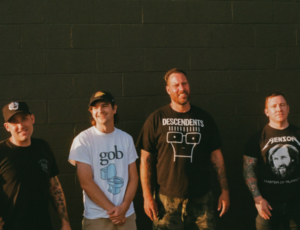>
J. Cole’s not there yet.
Every track of the North Carolina rapper’s second studio album Born Sinner oozes discordance. Not in the sound — the tracks, for the most part produced by Cole himself, have a smooth, cohesive feel — but in the artist’s obvious uncertainty. Where in the rap game does J. Cole belong?
Cole’s clean flow is often undercut by the familiarity of the ‘bitches’n’money’ content, but at the same time, his unique insights make it impossible to feel comfortable in clichéd territory. Some rappers can do a full album of pointless wordplay, create an enjoyable, un-memorable product, and be happy; Cole’s aspirations are obviously higher. Along with Drake and Kendrick Lamar, Cole name-drops Blackstar and Martin Luther King Jr., and he declares his dedication to the art of his craft on “Let Nas Down”.
That’s what makes his bullshit lines so frustrating. On “Runaway”, Cole raps: “The preacher says we were made in the image of Lord / To which I replied: ‘Are you sure?/Even the murderer? Even the whore?’” Two thoughts: murderers are not the same as “whores”; and also, yes. Genesis 1:27. If you’re gonna wax Christian, don’t second-guess the Old Testament.
Of course, the “whore” line might not get such a reaction if it weren’t followed up immediately by Cole’s explanation of “a good girl at home folding clothes and shit”. There’s a marked conservativeness throughout the album on the topic of women, and an ugly one – women are either hoes looking for a handout, shamelessly on the hunt for anyone with money; a supportive woman at home; or, well… not on the album. “Show a lot of love to my sisters though,” J. Cole assures us, though that love seems conspicuously absent. “But these bitches so predictable,” he continues.
Cole’s uncertainty is prevalent throughout. He still seems surprised by the attention his fame gets him, and if he’s not surprised, then he’s bitter at being treated differently than before. And his before/after thinking muddies his attempts to speak out against the emptiness of wealth. When he talks about having nothing and hating “rich niggas”, it’s hard to take him seriously, and when he raps to a woman that she deserves “the whole enchilada / Gucci and Prada,” it’s the nail in the coffin for his sincerity — on one side or the other, he’s projecting a calculated image rather than being genuine.
It’s not that Cole should be above rapping about hoes and money, or above gangsterism. Lines like “life’s a bitch and the pussy is wet” perfectly capture the joy of hip hop swagger, and are an important part of the album. But if J. Cole intends to claim a place next to some of his idols, positivity and consciousness in his lyrics can’t be a halfway measure. The great rappers of every generation, like most great poets, carried with them a quiet knowledge of the world, an acceptance that didn’t dull reaction, but instead struck deeper; they loved and hated out of a complete and unique understanding.
J. Cole has it in him. But – young, uncertain, swayed by a corrupt mainstream – he hasn’t quite given us the album that he should. One or two down the road, though… There’s a classic album coming…










